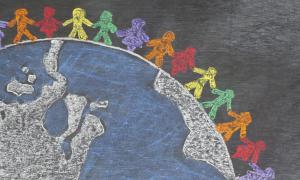article
1,764 Results
article
article
Survey Says?
Teaching Tolerance asks educators about the social climate of their classrooms
article
Alabama’s Immigration Law: The New Jim Crow
Alabama’s new law—with provisions against hiring, harboring or transporting undocumented immigrants—is bad enough for adults. But it is potentially disastrous for kids.
article
Magical Cloaks and Targets?
In the wake of more shootings, this white educator and father contemplates how he can undermine a system that makes his sons and him safer than their African-American counterparts.
article
Commemorating the Universal Declaration of Human Rights

On this important anniversary, integrate the Universal Declaration of Human Rights into your classroom reading instruction.
article
You Spoke, We Listened
Reader Exchange “Out At Last” from the Summer 2013 issue sparked discussion online. Though I’m an LGBT teacher, I do think that there are professional boundaries and my love life isn’t relevant to my student’s
article
article
Connecting Past and Present With Primary Sources
When two American Studies teachers combined their classes to discuss school integration, they fostered a depth of learning they never anticipated.
article
